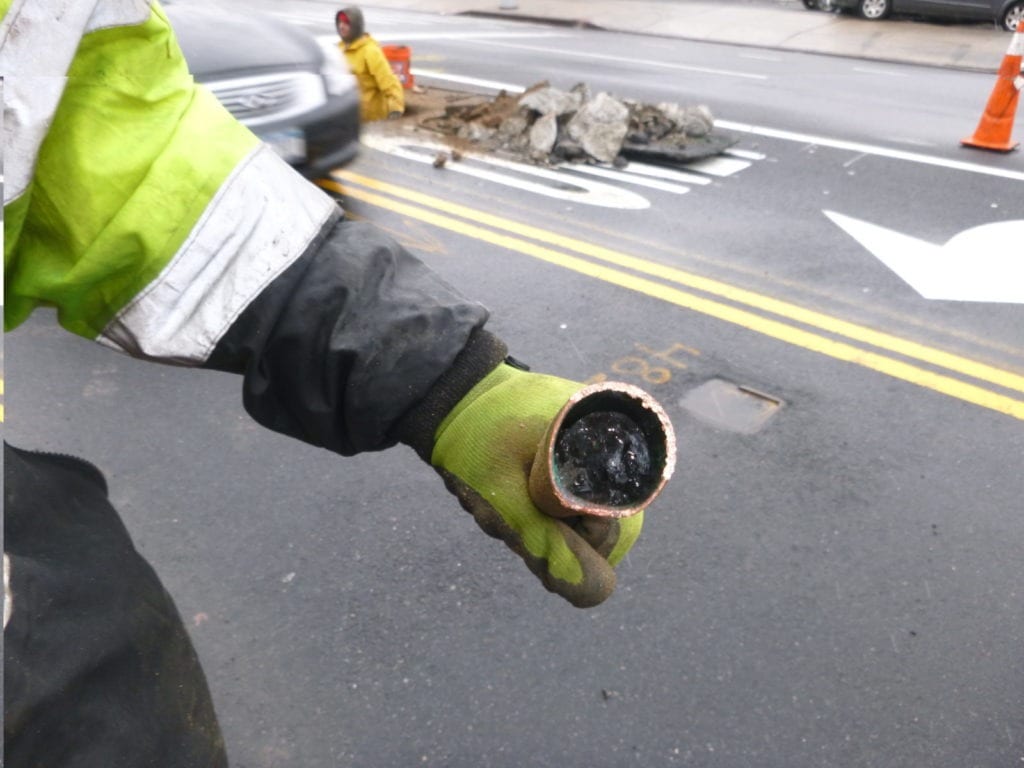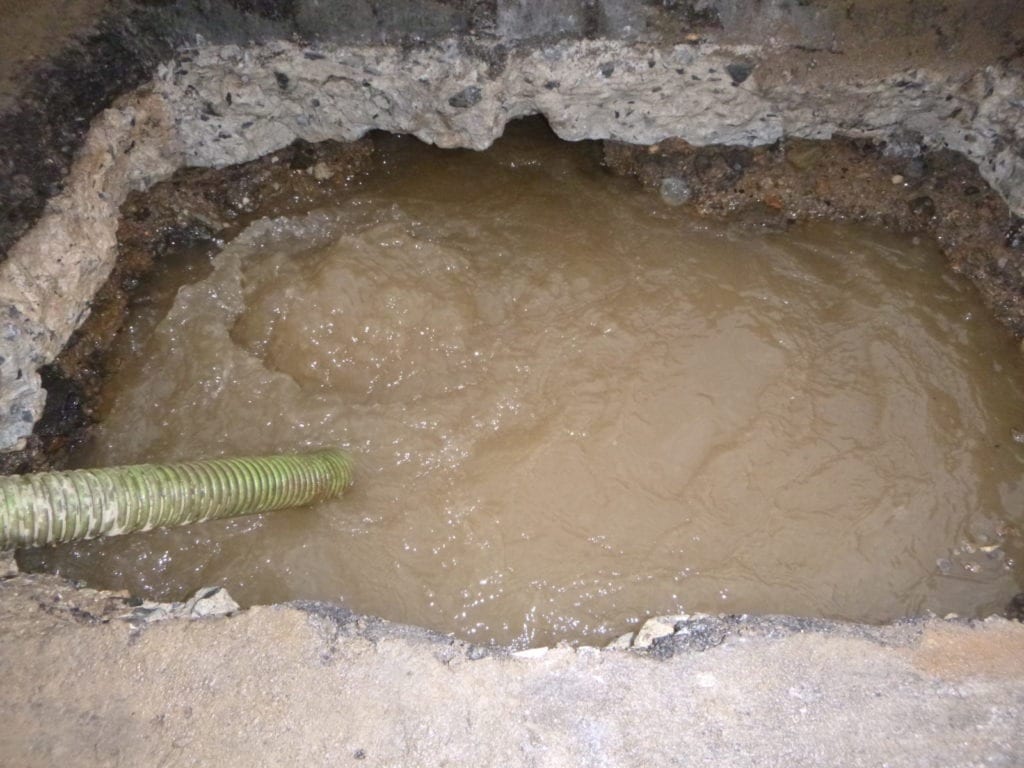How does your water main freeze?
The main pipe feeding water to your home may freeze if the temperatures drop below 32 degrees. This freeze will cause an expansion of water inside of the pipe creating a barrier for any water to flow beyond this point.
There are three primary facts to be aware of when trying to avoid your water main from freezing during the winter or to assist in the event you have already experienced a leaking water main.
- Locate your water main shut off valve and familiarize yourself with how it functions, it is also suggested to make other family members aware of the location and functionality in the event of an emergency. This would be most helpful if you have experienced a frozen or leaking pipe inside of the house. In this case you can slowly close the main valve which will stop the water from entering your home. If you are utilizing the main valve and the water doesn’t stop, the valve continues to spin or if the valve itself begins to leak it is suggested to leave the valve alone and call a licensed plumber to avoid any additional damage.
- Make sure you water line is located in a warm area. If you water main is located in an area of the house that is not heated such as the garage, a crawl space or the attic, it is suggested to apply heat using a space heater, wrap the pipe with insulation or have your licensed electrician install heat tape on the pipe. If you have piping that sits on an outside wall and is in a cabinet, it is suggested to keep the doors open and allow the internal heat to assist in keeping the pipes warm. You should also leave the heat in your home at a minimum of 60 degrees.
- If you are experiencing consecutive days of freezing weather it is suggested to keep a small stream of water running in a faucet on the top floor of your house. In this case you are looking to keep the water moving which is less likely to freeze. Many homeowners leave a very small stream of water running throughout the entire winter just to avoid the possibility of a frozen or leaking pipe.
Signs of a frozen water main
- If you can see ice forming on the outside of the pipe
- No water coming out of your plumbing fixtures – shower, sink, washing machine, toilet etc.
- You have become aware of a noise or a steady vibration from the piping in your home
- A stream of water or a sink hole is forming on the outside of your home
What to do if your pipes freeze
First you want to determine where the pipes are frozen. If only a few of the faucets in your home are working you know that your pipes are frozen inside of the house and the water coming from the city main is fine. If you are able to locate the section of piping that is frozen inside of the house you can try to thaw the pipe out at your own risk. There is a possibility that the pipe will begin leaking when it is thawed as a result of the expansion and contraction from the frozen water. You should be prepared to close the main water valve as a precautionary measure.
You may thaw the pipes by wrapping them with rags that have been soaked in boiling water over and over. Please do this with caution and be mindful that you may end up with more damage than anticipated if the pipes break and create a heavy leak.
You should never try to thaw the pipe with an electrical device or an open flame. These options can cause a fire or create an electrical shock resulting in bodily harm.
If you do not have water in the entire home there is a good chance that the main water line feeding your house is either frozen on the outside of the house, under the sidewalk or under the roadway. There is also a possibility that water line is frozen at the point it enters the house which can be treated as noted above.
What to do if your lead water main is frozen
If you have an existing lead water main and are suffering from frozen pipes it is strongly suggested not to touch the pipes. An old lead water main is prone to leaking and breaking if tampered with at all. Usually the age and condition of the pipe will not allow for any type of “play” and there is a good chance that the frozen pipe will end up leaking immediately.
What steps to take if frozen on the outside of your home
There are a few steps to take if you have completed your internal research and have determined that the water main is frozen on the outside of the home. First you can attempt to isolate where the frozen section of pipe is located. In many scenarios this becomes a real challenge in NYC due to the location of your home in accordance to the city mains.
The average home is located 50′-60′ away from the city main, attempting to isolate the freeze would require your licensed plumber to excavate several holes in the property, roadway or sidewalk before determining where the pipe is frozen. The challenge with this option is that it may end up taking more time and costing more money to locate the freeze instead of replacing the entire water main at once.
Most people ask “why would I replace the entire water main if only one section of my pipe is frozen?” When replacing the entire water main the plumber knows exactly what is ahead of him as the installation is a standardized process. There are not many unknown variables when replacing a pipe from the city main, to the house. When digging several holes attempting to isolate the freeze the plumber doesn’t know how much time, material, restoration etc. it will take before the repair work is completed. For this reason it is always suggested to avoid the risk and replace the entire water line for a quick and potentially more cost effective option.
Recently in Queens we replaced a water line due to a frozen section of pipe, this property owner agreed to avoid digging several holes to only replace the frozen section of pipe. The installation crew was able to locate the freeze as it was under the roadway just before the city main.

Frozen section of the city main |
The final option would be to wait it out. The risk here is that waiting it out can take anywhere from 1 day, to 4 months. In the case of a frozen water main many homeowners assume that the pipe will defrost after one day of temperatures above 32 degrees. Unfortunately this is not the case, just because the temperatures are rising it does not mean that the temperature of the actual grounds are greater than 32 degrees.
Recently in Manhattan we had a customer who decided to wait it out for a week due to the projected forecast reaching the mid 50’s in a few days. Unfortunately the grounds remained freezing and not only did the pipe not thaw out but it ended up cracking and leaking due to the expansion and contraction of the water inside the pipe.
Once we opened the hole in the roadway we encountered a pool of water requiring special pumps to relieve the excavation before we could close the connection on the city main.

The result of a frozen water main |




















